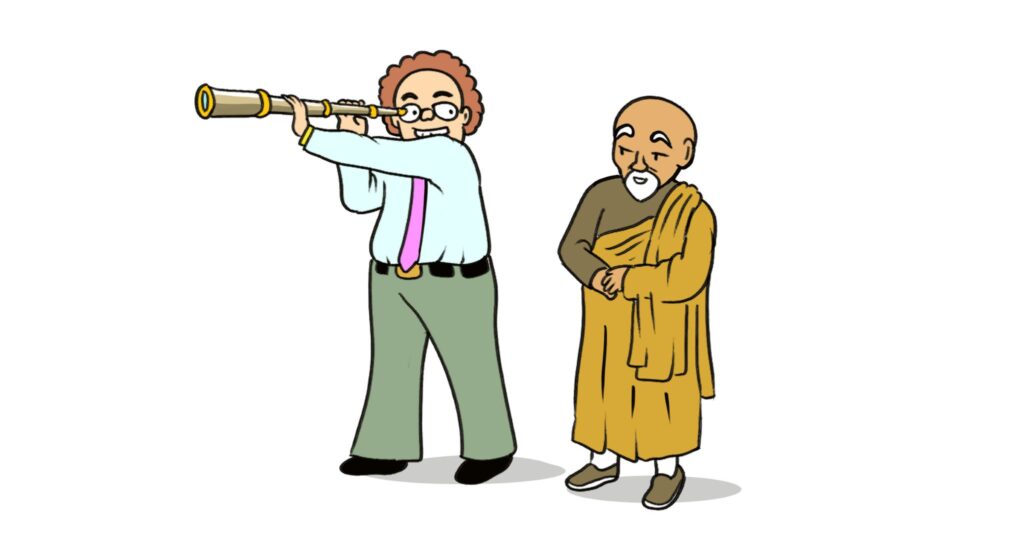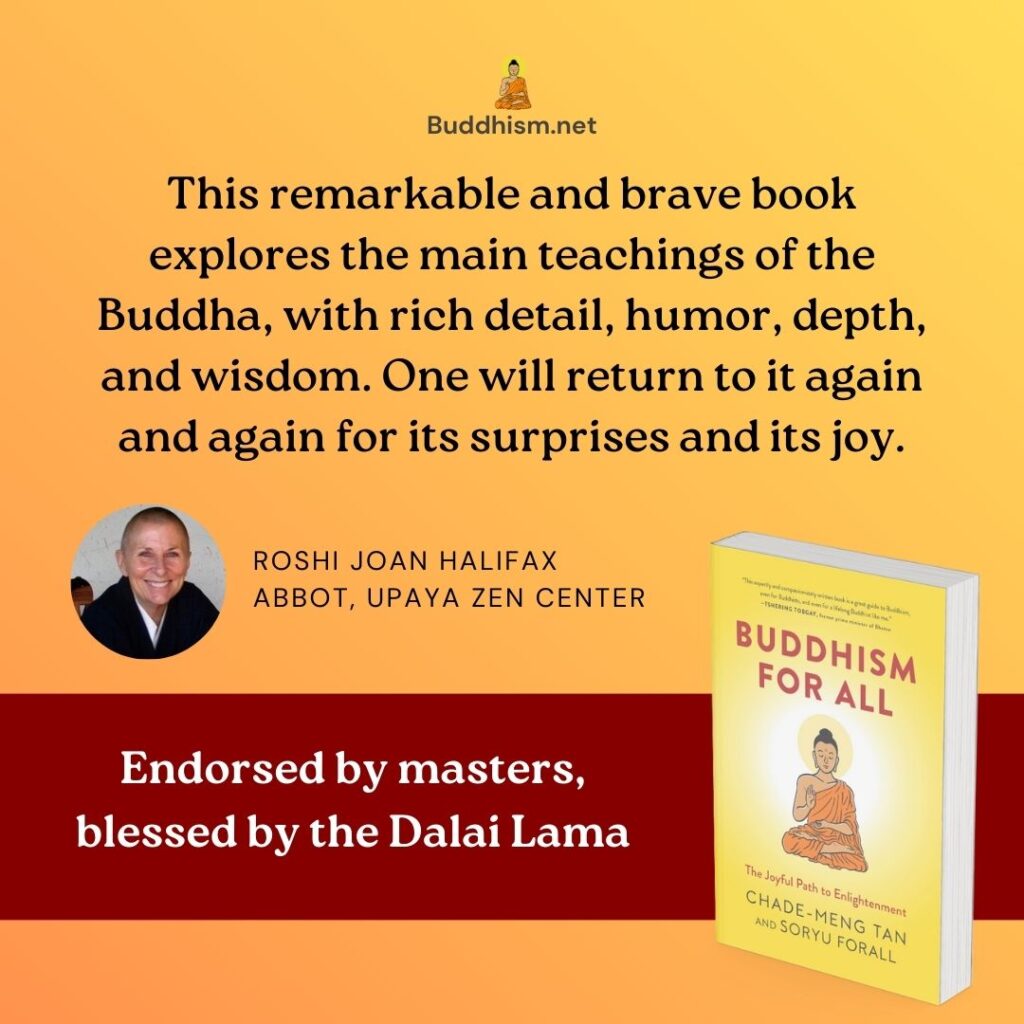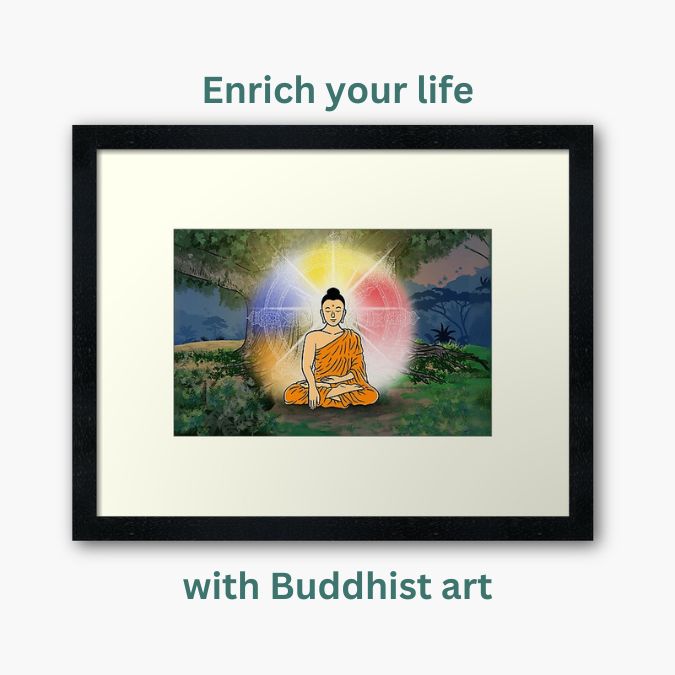
“We prefer instruments that look deep inside the mind.”
(Context: Buddhism’s comfort with modern science.)
You may ask, if Buddhism was so comfortable with science, why didn’t they develop the fields of physics or chemistry or biology, and why didn’t they invent telescopes?
Buddhism could have been the tradition that gave us modern science. The most important thing that gave birth to modern science is what historians call the “Discovery of Ignorance”. Buddhism was possibly the earliest major tradition in the world to discard dogma and place observation and investigation at its center, so you would think that Buddhism would be the natural pioneer in the Discovery of Ignorance. Why then did modern science not emerge from a Buddhist civilization?
The main reason is that other things were also needed for modern science to emerge. In the book, Sapiens[1], historian Yuval Noah Harari identified three essential things that led to the rise of modern science:
1. The willingness to admit ignorance. Modern science is based on the Latin injunction ignoramus – ‘we do not know’. It assumes that we don’t know everything. Even more critically, it accepts that the things that we think we know could be proven wrong as we gain more knowledge. No concept, idea or theory is sacred and beyond challenge.
2. The centrality of observation and mathematics. Having admitted ignorance, modern science aims to obtain new knowledge. It does so by gathering observations and then using mathematical tools to connect these observations into comprehensive theories.
3. The acquisition of new powers. Modern science is not content with creating theories. It uses these theories in order to acquire new powers, and in particular to develop new technologies.
Of these three, [1] sounds exactly like Buddhism, but while observation is central to Buddhism, mathematics is not, and therefore, Buddhism only has half of [2]. Needless to say, Buddhism has no interest in [3]. Therefore, of these three things, Buddhism only has one and a half, and that is probably why modern science did not emerge from a Buddhist civilization.
In addition, Buddhism is totally uninterested in metaphysics. In the “handful of leaves” simile, the Buddha makes clear that he only teaches a tiny subset of everything he knows, and that tiny subset are those teachings that lead to liberation from suffering. Metaphysical questions fall well outside of that subset. In fact, the Buddha was asked those questions, and he famously refused to answer. This is known in Buddhism as “noble silence”.
There was a monk by the name of Mālunkyāputta. He had a list of ten metaphysical questions[2]:
- Is the world eternal?
- … or not?
- Is the world finite?
- … or infinite?
- Is the soul the same as the body?
- … or different?
- After the Buddha dies, does he exist?
- … or not exist?
- … or both?
- … or neither?
He presented this list of ten questions to the Buddha and said if the Buddha did not answer them, he would leave the monastic order. The Buddha refused to answer them. Why? Because those questions do not lead to “disenchantment, dispassion, cessation, peace, direct knowledge, enlightenment, nirvana.” That was why the Buddha left them undeclared. The only things he would declare are things that lead to nirvana, which are the Four Noble Truths.
To reinforce the point, the Buddha gave the famous simile of the man struck by a poison arrow. Suppose, a man was wounded by a poison arrow, and his friends brought a surgeon to treat him. The man would say: ‘I will not let the surgeon treat me until I know whether the man who wounded me is a noble or a brahmin or a merchant or a worker, and his name and clan, how tall he is, his skin tone, whether he lives in a village or town, etc, etc etc.” By the time this man found out all the answers, he would be dead. His highest priority should have been to let the surgeon treat him first. In the same way, a monk should learn and practice the Dharma first, instead of being distracted by metaphysical speculations.

“Before you treat the patient, please fill out this questionnaire.”
This is probably why Buddhist monks never invented telescopes. Buddhism is unconcerned about metaphysics, and by extension, generally unconcerned about how things work in the physical world. Their application of the scientific method is entirely internal, aimed only at looking at the mind to gain insights into suffering and liberation from suffering. Anything else is a distraction.
Mālunkyāputta was satisfied with the Buddha’s explanation. He stayed. In case you wonder what happened to him later, in the ancient texts, he was scolded by the Buddha at least twice (including for threatening to leave the order if the Buddha didn’t answer his metaphysical questions). Finally, when he was an old man, he went to the Buddha again for more teachings, the Buddha gave him a surprisingly short and basic teaching: “Four things give rise to craving in a monk: food, clothing, lodging, and rebirth in this or that state. A monk who gives up that craving completely makes an end to suffering.” Mālunkyāputta meditated on those instructions and achieved full enlightenment.[3]
Activities
- Reflect on this post with Angela:
- Continually examine your mind. Be mindful of your thoughts. Are your questions, incessant thoughts, and mental investigation helping you reduce your own suffering, attain liberation, or be more joyful, wise and compassionate?
- What stood out to you from this article? Why?
References
[1] Yuval Noah Harari, Sapiens: A Brief History of Humankind. Harper (2015).
[2] Majjhima Nikāya 63.
[3] Aṅguttara Nikāya 4.257.
Artwork by Colin Goh.


